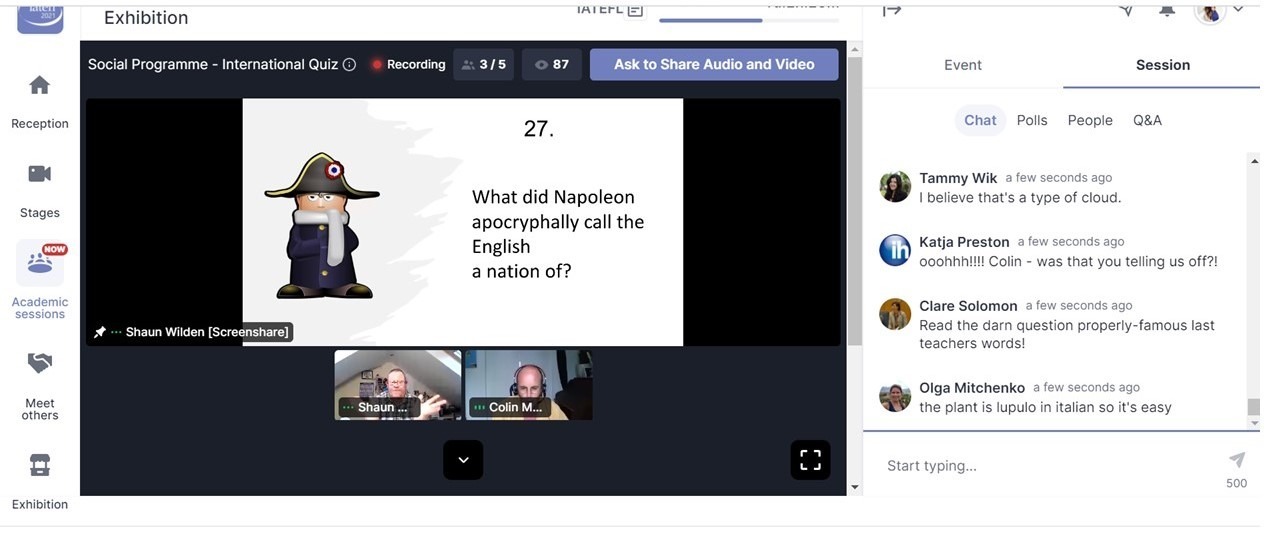Contributor Krzl Nuñes is a freelance online English teacher from the Philippines. Currently living in Chile, she has been giving classes to young learners and adults for the last eight years and has developed her niche in Business English and English proficiency exam prep.
Whether you’re an ESL educator, a teacher trainer, or a school owner, attending English teaching conferences is a great way to grow professionally, expand your network, and even branch out in your career. I had the chance to do these things and more when I participated in the 54th annual International Association of Teachers of English as a Foreign Language (IATEFL) International Conference, Exhibition, and Careers Fair, which was held online for the first time June 19th- 21st, 2021. Here’s a rundown of my experience at the virtual conference and the top benefits it offers English language professionals.
1. Professional development opportunities
From current trends in the TEFL industry to online English teaching techniques, the IATEFL Conference featured a variety of presentations, forums, and exhibitions, which were grouped in sessions throughout the three-day event. Though there were plenty of topics in the program lineup that caught my eye, I decided to focus on sessions related to the following themes.
Global issues
With the sudden rise of virtual learning during the COVID-19 crisis, a lot of the talks and forums in the conference tackled pressing issues and new practices in online English teaching. As an online ESL teacher, I considered these topics important for understanding my own learners’ concerns about adapting to the digital classroom and using technology for studying purposes.
For instance, a talk entitled “The Digital Literacy Divide” pointed out how students’ varying knowledge of digital technologies has created a gap and how English teachers can help close this gap through task-based learning. On the other hand, a forum on flipped/blended learning discussed how teaching materials have been transformed to adapt to the new type of learning, which involves combining digital tools with established classroom methods to enhance students’ online learning experience.
Teaching specific language skills and niches
Before attending the conference, I only relied on courses and my own research to develop my ESL teaching methods and materials for specific types of learners. After the online event, however, some of my biggest takeaways were strategies and activities that can enhance my EFL classes. For instance, I wouldn’t have thought of integrating punk rock music-inspired ethics into my classes or using storytelling in my Business English lessons!
In addition, I’ve also gotten invaluable tips on preparing learners for English proficiency tests like the International English Language Testing System (IELTS) and Test of English as a Foreign Language (TOEFL). As I’ve chosen language test prep as a teaching niche, I found it very helpful to attend talks and workshops dedicated to teaching the challenging parts of these tests, like reading and writing.
Take a Micro-credential certification course in Teaching IELTS Exam Prep.
2. Using the interactive platform
Sure, we may miss the feeling of socializing at conferences or going around to visit cool booths in person, but at least we still have the online option to interact with each other and check out showcases of different organizations. As Sara Awad, IATEFL Business English Special Interest Group (BESIG) Publications Coordinator, commented, “Of course, there is excitement in face-to-face conferences, but still there is, for example, somebody who wouldn’t be able to travel in this time of the year, so it would be difficult if [the conference] was not online.”
The IATEFL Conference, despite being held online, did give attendees an experience quite similar to that in an on-site conference:
Are virtual ELT conferences the future for industry events? Find out.
3. Meeting people from around the world
Finally, who says that networking is a challenge in online conferences? On the contrary, the IATEFL Conference platform’s features allowed participants to make contacts, find potential business partners, and even just have a chat during break times!
Maria Vavilova, one of the presenters who talked about her and her colleagues’ experience in using whole-word and phonics approaches to teaching very young learners, similarly made the most of this online networking opportunity. “I’m a primary teacher. There are not many colleagues that exist and talk about the problems in primary classrooms, so I’m pleased to meet so many people around the world working and having the same problems, actually,” she shared. “I really like this experience.”
Join the Bridge Teaching English Online Facebook Group to connect with teachers around the globe.
And, true enough, the virtual IATEFL Conference allowed participants from all over the world to connect with each other. As an English teacher, it also made me feel part of a larger group that helps its members grow professionally and push for improvements in the English language teaching industry. Although it lacked physical interaction, for now, this online conference made it possible to bring the TEFL community together, even amidst the challenges of the pandemic that we’re facing these days.












